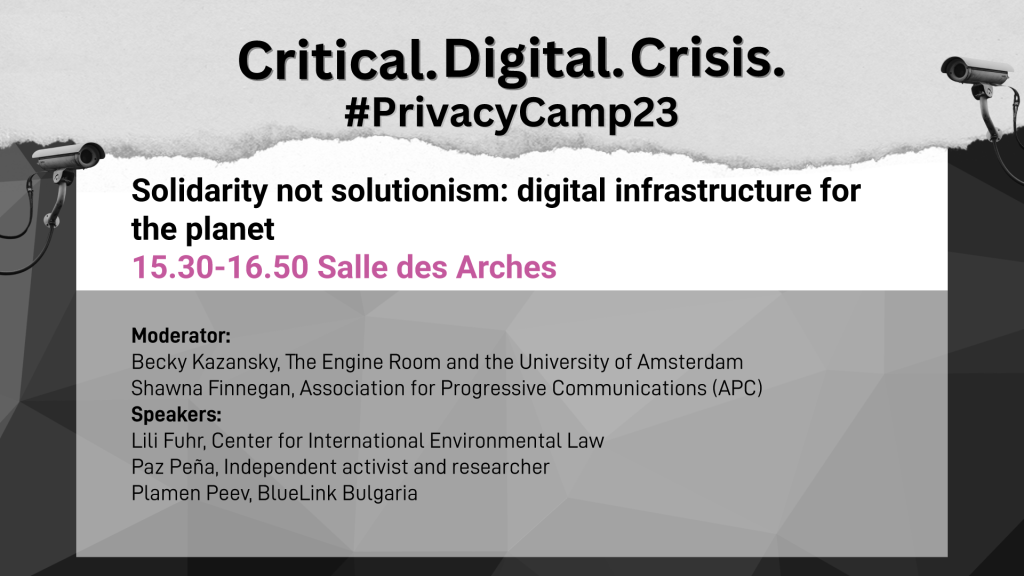Solidarity not solutionism: digital infrastructure for the planet
This January 25, 2023, a new version of Privacy Camp, an annual conference jointly organized by EDRi, VUB-LSTS, Privacy Salon vzw and the Institute for European Studies at USL-B, was held.
The Latin American Institute of Terraforming was present at the panel “Solidarity not solutionism: digital infrastructure for the planet”, and this was our first five-minute intervention to deepen the conversation.

I want to introduce the idea of techno-capitalism instead of talking only about big techs, in the understanding that although big tech is an excellent example of techno-capitalism, I believe that it is the “techno-capitalist ideology” also adopted as hegemonic logic by most digital developments -even by states- that must be fought as a solution to the climate and ecological crisis.
Basically, because, as Mél Hogan says, techno-capitalism implies “big data ecologies”, i.e. the creation of an infrastructure generally placed in foreign territories, specially conditioned to infinite growth, with intensive exploitation of natural resources to operate. If everything is subject to datification, digital infrastructures become more intensive in their consumption of natural resources. And that intensive infrastructure, in all its life cycle, affects human and non-human communities, which tend to be the bodies that matter least to capitalism.
This is why the false solution of the so-called “twin transitions” is dangerous, primarily as understood by the European Commission, where the competitiveness of Europe in the global economy is by far the first priority and where the complementarity transitions are more near a geopolitical idea than actual scientific truth.
One, due to the indirect effects of techno-capitalist digitalization, we will likely have a digital rebound effect in many industries. Hence, it is at least strange to seriously believe that they are complementary transitions when conclusive evidence is lacking.
But more importantly, to say that they are “twin transitions” is to accept that both green energies and digital technologies are the industries where the control of the world economy is being played out between China, the United States and the European Union. Thus, the “twin transition” concept is a more economical one than a “green solution” to the crisis.
But I want to return to the issue of techno-capitalism as the logic to be suspected as an approach to the climate crisis, not only looking at how big tech is portraying itself as a friend of the environment but also at initiatives that have much better press in terms of “green techs”, but that continues with techno capitalist logics.
And here, taking advantage of the fact that I am in a European forum, I want to bring Fairphone into the discussion. In their last book, Adi Kuntsman & Esperanza Miyake do a fascinating analysis of the images on the Fairphone website where, magically, the white bodies are the ones that repair, and the coloured bodies are the ones working in mines, but not just any mine: “socially responsible mines” according to the company. By the way, Fairphone is holding a series of conversations in Chile to see sustainable lithium extraction methods. But this green tech company, instead of first coordinating a conversation with the indigenous communities affected, chose to ally with large German companies of electric vehicles, that is, the big capital that today is part of a severe socio-environmental crisis at the Salar de Atacama in Chile.
It's like teaming up with Google to see a sustainable way to exploit personal data.
Adi Kuntsman & Esperanza Miyake state (and I strongly agree) that we cannot reduce a social justice problem to a feel-good consumption practice of European customers. This may give us a clue where we need to go in alternatives to techno-capitalism as a response to the climate and ecological crisis.
I don't want to extend further; I leave the conversation open for a collective reflection.
Thanks!